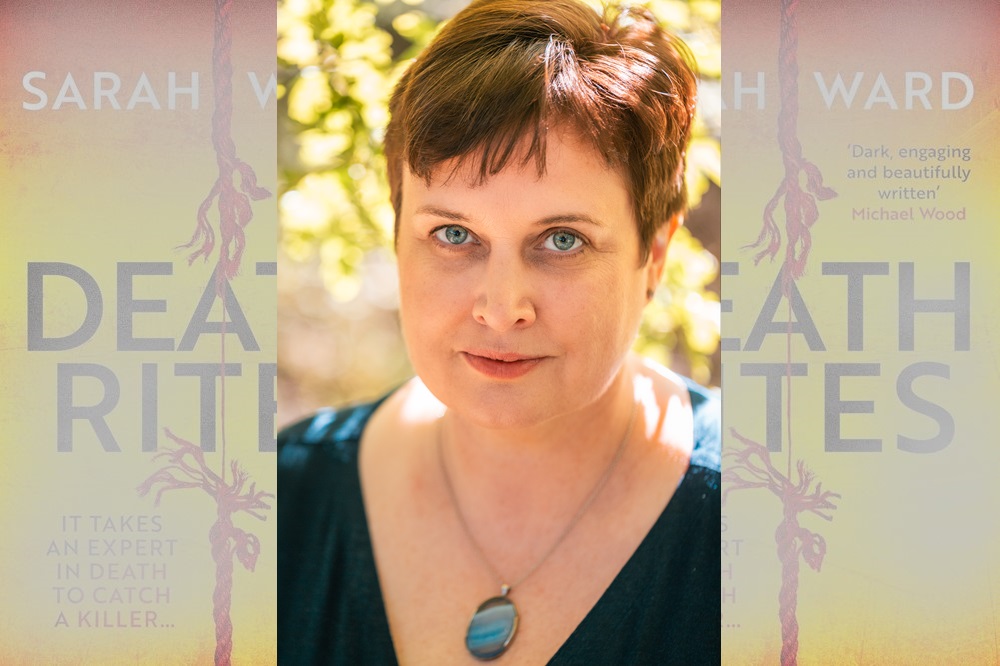On being a writer in Wales: Sarah Ward

Sarah Ward
As I sit here in my study in Lampeter thinking about being a writer in Wales, it brings home to me how everything has come full circle.
My earliest memories are of growing up in Neath. It was a joke amongst my Welsh family that I was the only English-born member (my father’s first post after Swansea University was a job with Esso in Southampton).
My mother always used to say how difficult those early days were living in England and how desperate she was to return.
She had been brought up inside what was then called the Welsh Folk Museum in St Fagans; her father Garfield was one of the first stonemasons employed there. My father is from Llandaff North, his own father working on the Great Western Railway starting as an engine cleaner and working his way up to train driver until he retired.
For me this embodies how I feel about being a writer in Wales – my mother’s side Welsh speaking and imbibed in the oral storytelling tradition (how my mother loved a good ghost story) while for my father’s side, Wales was a place of opportunity where hard graft and seizing opportunities reaped their rewards.
Obsessed
We left Neath in early 1976 and I spent the long, hot summer of that year in Fairwater, Cardiff. My dad had retired from St Fagans and was enjoying his spare time smoking his pipe filled with baccy and buying us kids presents.
We stayed with him temporarily as a stepping stone for my parents move out of Wales and I wasn’t to return to live here until 2023. However, I was always back in the country – visiting grandparents in Cardiff and other family in Ceredigion, trips which continued even when I was living in Greece.
Following the death of my mother in 2008, I became obsessed with my family history and holidays involved visiting Carmarthenshire and other parts of West Wales to find the ruins of old farmhouses once occupied by my ancestors as tenant farmers.
This family history was influenced by my first crime novel, In Bitter Chill where my investigator was a genealogist whose family had a connection to Cardiff.
Memories
I was yearning to live in Wales but sometimes it’s hard to revisit the past. Was my view of the nation stuck in my memories of the 1970s? Every time I returned to the capital, I was struck by how much it had changed.
I wrote five more books including two gothic thrillers using my middle name Rhiannon until finally I plucked up the courage and set my novel The Birthday Girl on an island off the Pembrokeshire coast loosely based on Caldey.
How I loved revisiting those memories of school trips to the island. As a child I’d been terrified of the monks living there – so removed from my chapel upbringing – and yet, as an adult, Wales’s essential gothic-ness was calling to me.
A cancer diagnosis during the first lockdown in 2020 put everything in perspective. As anyone whose been told they have a potentially life-limiting illness will know, you start to reassess the time left to you. I decided now was the time to come home and so what if my head was full of the past. It was time to embrace contemporary Wales and create new memories of my life here (although I did wait out the post-lockdown housing price surge).
Inspiration
Since moving to Ceredigion I’ve written two more books in my Welsh series – The Sixth Lie based in St Davids and The Vanishing Act set in Brechfa forest, home of many of my ancestors.
Living within the landscape where I locate my books provides an inspiration for new plots and I love weaving in Welsh stories from my childhood. The old favourite, the Beast of Brechfa even gets a mention.
Wales also provides inspiration for novels set further afield. Death Rites, my new novel is partly inspired by the imposing bed in Abernodwydd farmhouse at St Fagans. I loved the story of the daisy wheels or hexafoils covering the headboard, part of a long history of ritual house protection in Wales to keep the occupants of a home from evil.
I used this bed, and the history of witch bottles, burn marks, and geometric designs – all designed to trap a witch – as the driver for my murder plot, transposing my story to a fictional university in New England. Even in a US set novel, Welsh culture and folklore continue to inspire.
Sarah Ward’s latest novel, Death Rites is published by Canelo on the 3rd October. It is available to pre-order now and is available from all good bookshops.
Support our Nation today
For the price of a cup of coffee a month you can help us create an independent, not-for-profit, national news service for the people of Wales, by the people of Wales.






I like Sarah’s books but am disappointed with this article.Perhaps the title is misleading. “On being a writer in Wales” didn’t suggest to me a collection of places in Wales where Sarah has lived. Forgive me but that is of limited interest unless each place produced strikingly different books. What I expected or hoped for was the in-the-moment weave of being a writer in Wales. How is settling at the keyboard different here to anywhere else? For example the Mediterranean countries mean avoiding hot afternoons. A brisk walk to clear the head between paragraphs or deep in a knotty plot… Read more »